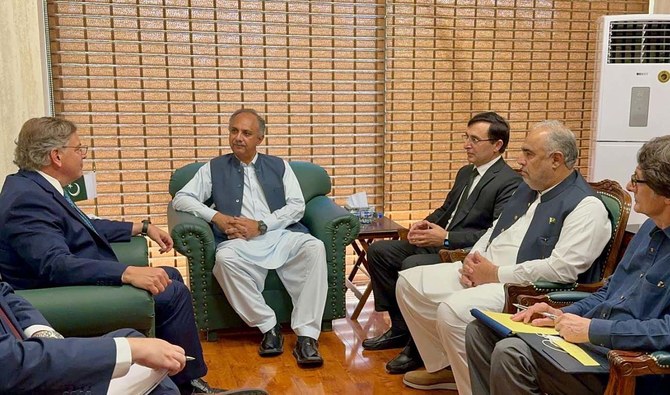ISLAMABAD/KARACHI: Raids to round up undocumented migrants and move them to holding centers started across Pakistan on Wednesday, officials said, as a Nov. 1 deadline to leave voluntarily expired.
Pakistan last month gave foreigners without documents or registration about four weeks to leave of their own accord or face deportation. According to the interior ministry, 140,322 illegal foreigners residing in Pakistan have returned to their respective countries voluntarily since the deadline was announced on Oct. 3.
The government has set up 49 deportation centers to temporarily house illegal migrants, including an estimated 1.7 million undocumented Afghans, and said anyone found staying in the country without authorization from today, Wednesday, would be taken to one of the facilities.
Although the government insists its expulsion order does not specifically target Afghans, they form the largest number of undocumented foreigners in the South Asian nation, many of them having lived in Pakistan their entire lives. Also, since the deadline announcement, Islamabad has blamed Afghans for multiple militant attacks, including 14 of this year’s 24 suicide bombings. The government also says hosting millions of refugees has drained its resources amid an economic crisis.
On Wednesday afternoon, officials in Karachi, Pakistan’s commercial capital, where an estimated 100,000 undocumented Afghans live, said raids were ongoing to identify those who had not left of their own will.
“Operation has started and raids are being conducted in different parts of the city,” Irfan Bahadur, Senior Superintendent of Police (SSP) East Karachi, told Arab News.
“In a raid in Machhar colony a while ago, 25 people have been taken into custody who are being shifted to a holding center at MoHajjir Camp. After their screening at the camp, they will be deported.”
Later, a spokesperson of the Karachi commissioner told Arab News 100 undocumented foreigners have been brought to holding centers in the city.
Earlier in the day, police patrolled various neighborhoods where Afghans live and urged them to return voluntarily.
“All illegal immigrants should return back to their countries by 12am tonight [Thursday],” a policeman said on a loudspeaker in a video recorded by Arab News. “If they are facing any troubles or issues in this regard, or have any transport-related issues, then they should report to their nearest police stations.”
Jan Achakzai, the information minister of southwestern Balochistan, which borders Afghanistan, said at least 100 people had been arrested on Wednesday in an operation that would “continue until every last illegal immigrant is expelled from the province.”
There are an estimated 250,000 illegal migrants in Balochistan, he added.
“Law enforcement agencies have been authorized to begin detaining and transporting illegal immigrants from today to holding centers for biometric verification and subsequent deportation at the Chaman border,” Achakzai told Arab News, referring to a main border crossing in the province.
In a press conference later in the day, the minister said Pakistan had become a “haven for illegal foreign nationals” who were involved in militancy and other illicit activities.
“The time has arrived to take action against those illegal foreign nationals who haven’t heeded constant warnings,” Achakzai told reporters. “Those who are providing homes for illegal immigrants will also fall under the purview of the law.”
“HOLDING CENTRES”
Fazal-e-Rabbi, project director at the Commissionerate for Afghan Refugees in the Khyber Pakhtunkhwa (KP) province, which borders Afghanistan and is home to the largest number of Afghan refugees, said 49 holding centers had been set up across the country for the repatriation of illegal immigrants.
“The purpose of the holding points is to screen the passengers and allow them to cross the border respectfully,” he said in a phone interview.
Three holding points had been established in KP at Peshawar, Landi Kotal, and Haripur, while eight crossing points would be used for Afghans to cross back into their home country from KP and Balochistan, which also borders Afghanistan.
He said identification and other process would be completed at holding centers, after which security personnel would escort the migrants in buses to border crossings, where they would travel into Afghanistan on the same vehicles.
“Torkham, Kharlachi, Ghulam Khan, and Angoor Ada crossing points will be used for KP, Islamabad, Gilgit-Baltistan, and Punjab [province], and for Sindh and Balochistan [povinces], Chaman, Barab Chah, Noor Wahab, and Badini crossing points have been allocated,” Fazal-e-Rabbi said, adding that the interior ministry had set up a “control room” monitor and facilitate the process of repatriation.
“Khyber Pakhtunkhwa government has also issued a 1700 emergency number to deal with any situation,” the officer added.
Syed Mubasher, Director Public Relations for police in Punjab, said 36 holding centers had been set up in the province.
“From November 3, evacuation of illegal immigrants will be started in a phased manner across Punjab,” he told Arab News, explaining that they would be kept at holding points during the transfer process and their transport, logistics, food, and other arrangements would be the responsibility of the district administration.
“The law enforcement agencies in Punjab have chalked out a comprehensive strategy,” Inspector General of Punjab Police, Dr. Usman Anwar, said in a video statement on Wednesday. “All our raiding parties will be with cameras and will ensure through body cams and other recording mechanisms that they are not accused of human rights violations.”
In Sindh province, police official Haseebullah, who is dealing with repatriation, said two holding centers had been established in Kemari and Malir districts “to keep illegal immigrants before sending them for deportation.”
Aslam Nasir, Public Relations Officer for Balochistan Police, said three holding centers had been established in Quetta, Chagai, and Pishin districts in the province.
“Arrangements have been finalized at four exit points for the repatriation of the illegal Afghans to their country through Balochistan province,” he said.
Achakzai, the Balochistan information minister, said two holding centers in Quetta, the provincial capital, had the capacity to accommodate 800 people.
“As of now, nearly 40,000 individuals have voluntarily returned from the Chaman border [since the announcement of the deadline] and three more points and these include also immigrants coming from Sindh province.”
Muhammad Taqi Jawad, a spokesperson for Islamabad police, told Arab News 64 illegal immigrants in police custody had already been transported to the border for repatriation.
“The process of evacuation of illegal residents has been started after the deadline and now legal action will also be taken against those who give shelter to illegal resident foreigners along with their employers,” he told Arab News.
“One holding point is established at Hajji Camp in Islamabad and a strategy is already in place to check such persons based on available information and transfer to border crossing points.”
In a video message released hours before the expiry of the deadline, Interior Minister Sarfaraz Bugti said migrants would be kept in holding centers for up to three days:
“We will try to provide them with food and health facilities and after that we will deport them through the border of our choice which will be in keeping with our security [requirements] and convenience.”
“NO PERPETUAL BAN”
On Tuesday, Caretaker Prime Minister Anwaar-ul-Haq Kakar announced there was no “perpetual ban” on the return of Afghan nationals to Pakistan.
“We have not placed a perpetual ban on them that they cannot come back to Pakistan after today,” Kakar told journalists.
“They should go to their countries, get their travel documents issued from their states, get visas from our mission there. Whether they want to come for educational purposes, for business, whatever their purpose may be, we will facilitate that.”
The government was only against “irregulated” travelers, Kakar added.
Western embassies and the United Nations have urged Pakistan to identify and protect Afghans at risk of persecution at home.
“Amnesty International strongly reiterates its call to the Government of Pakistan to immediately reverse its decision to forcibly deport unregistered Afghan refugees ahead of the deadline set for tomorrow,” the group said in a statement.
Qaisar Khan Afridi, a spokesperson for the United Nations High Commissioner for Refugees (UNHCR) Pakistan, said the global refugee agency had appealed to Pakistan to continue its protection of all vulnerable Afghans who sought safety in the country and could be at imminent risk if forced to return.
“Afghanistan is going through a severe humanitarian crisis with several human rights challenges — particularly for women and girls, and a series of natural disasters,” he told Arab News.
Pakistan has hosted at least four million Afghans since the 1979-1989 Soviet invasion of Afghanistan, numbers that swelled after the Taliban seized power in Kabul in August 2021.
The government says those with Proof of Registration (PoR) and Afghan Citizenship Cards (ACC) would not be expelled by Nov. 1 but many Afghans have complained of harassment and arrests despite having valid documents. Authorities deny this.
“When we go to work, policemen stop us and inquire where we are from, what our purpose is, and where we are going,” said Luftullah, an Afghan who was boarding a bus from Karachi to the border on Tuesday.
“I then show them my card, the Afghan Citizen Card. After seeing it, they say it has expired. I also show them a letter from the government of Pakistan, which states that those who have Afghan [Citizen] Cards can stay in the country, but they refuse to accept it, call it a lie and then say all kinds of things.”
“TIME TO PREPARE”
As pressure mounts at border posts swarmed by thousands of returnees fleeing the threat of deportation, Afghanistan’s Taliban government urged Pakistan to give undocumented Afghans in the country more time to leave
In a statement late Tuesday, they also “asked them [Pakistan] to not forcibly deport Afghans with little notice but to give them time to prepare.”
“In countries where Afghans live, they have not threatened the security of those countries, nor have they been the cause of instability.”
Border officials on the Afghan side at the Torkham crossing in eastern Afghanistan said they were facing an “emergency situation” as they tried to keep up with waves of arrivals in their thousands.
AFP reported an ad hoc settlement had sprung up near the border post, where people were becoming increasingly desperate, sleeping outdoors with limited access to food, water and medicines as they waited for registration.
The Afghan government has established a High Commission to address the issue and said two temporary camps would be set up in the area near Torkham.















